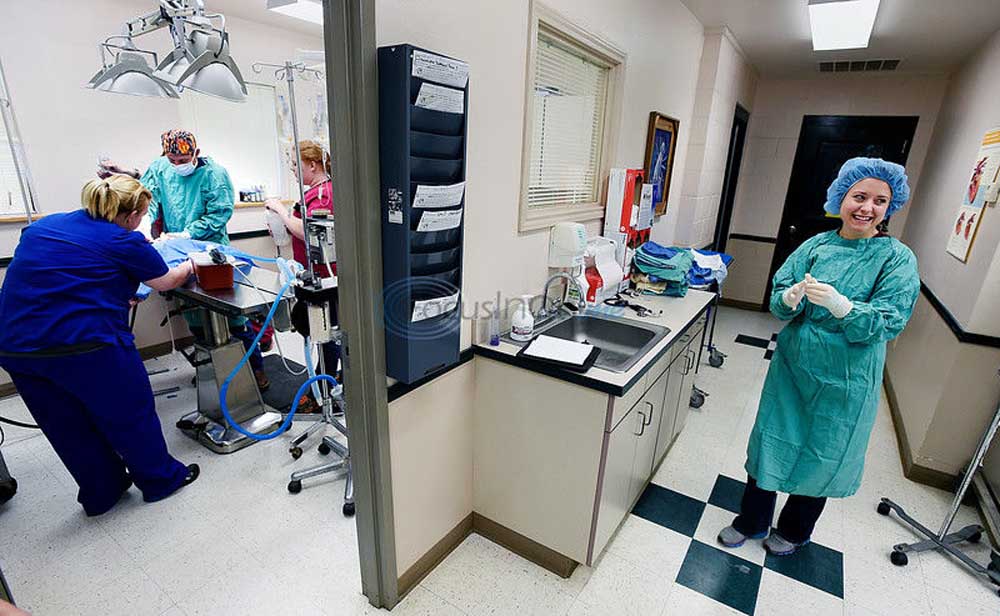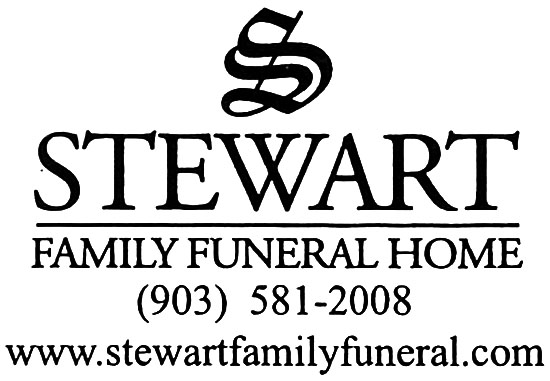Quitman Animal Clinic puts pet owners before profits
Published 11:56 pm Saturday, July 4, 2015

- Veterinary student Jessica Webster, right, is all smiles as she prepares to assist Dr. Jeremy Smith, center at left, with surgery on a dog Thursday, June 18, 2015, at Quitman Animal Clinic in Quitman. Dr. Smith said he believes in giving students hand-on experience after another doctor took Smith under his wing while he was in training. Andrew D. Brosig/Tyler Morning Telegraph
QUITMAN — A tiny Chihuahua trembles nervously on a veterinarian’s exam table as a gentle sedative is administered, helping it to relax and drift off to sleep.
The drowsy dog is about to have its teeth cleaned at Quitman Animal Clinic, but like some humans, he isn’t exactly a fan of dental work and fights to stay awake.
Eyes blinking, he soon relents and falls sound asleep under the bright lights, oblivious to the probing, brushing and filming that follows.
This type of cleaning is important because dirty teeth can turn into infection and serious illness, said Dr. Michael Miller, eyeing the x-rays while the dog snoozes nearby in a soft, heated blanket.
“I really fell in love with this area, I’m a very mechanical person,” Miller said of his fascination with animal dentistry. “We’re a mixed practice, so we all do some of everything. There are days when I go from extracting teeth to pulling a calf, but that’s the way it isaround here. Every day is its own beat, but it’s all a wonderful experience.”
At the busy Quitman Animal Clinic, 1142 E. Goode St., in Wood County, there’s no such thing as a boring day at work, and the folks who work there seem to like it that way.
Veterinarians see a variety of four-legged patients, from Shetland ponies to Shetland sheepdogs, but it’s the owners who keep the clinic on speed dial.
The practice welcomes 25,000 patients a year through its doors; about 15 percent of those are driving in from the Dallas and Fort Worth area to visit.
Dr. Randal Bennett, a practicing veterinarian for 31 years, said it’s not necessarily the scenic atmosphere drawing people out of the big city, so much as the clinic’s culture of putting relationships with pet owners ahead of profit.
He co-owns the practice with Dr. Jeremy Smith, but downplays his role, describing his presence as “servant leader.”
“It’s not about us,” Bennett said. “Our larger goal is to help the clients. That means we take the effort and help any way we can … we are the caretakers of these animals.”
Community outreach is a big focus in clinic operations: pet health, responsible ownership, behavior modification, owner education and pet adoptions to name a few.
The clinic may be best known around the Quitman area for its free pet fairs, a community staple for 14 years and running, offering attractions such as free food and wiener dog races.
About 1,000 people ignored rainy skies to attend its most recent, two-hour affair, donning boots and rain galoshes to slog through mud with their furry friends.
“The Pet Fair came about as an idea to help our clients, like a customer appreciation,” Bennett said. “Our objective is to make it about animals.”
The clinic also enjoys a steady following on its Facebook page, thanks to the power of social media to reach and educate pet owners.
Smith regularly creates “behind the scenes” videos of the clinic activities, such as techniques for finding fleas to exploring the miracles of ultrasound technology.
“The videos have been an interesting thing,” he said. “They are attracting a lot of views.”
Clinic physicians say they are willing to try new strategies to connect with others and adapt to changes in society.
A few decades ago, for example, dogs were viewed as flea-bitten sentries that lived under the porch and dined on table scraps, but not so any more.
Today’s dogs have their own menu, grooming regimen, wardrobe and place in the family hierarchy, some even hogging the covers as they compete for space in their owners’ beds.
“They are a big part of people’s lives,” Bennett said. “Sometimes, the dog loves them (owners) more than their own family.”
Animals seem to be living longer, healthier lives these days, thanks to advances in medication, technology and care.
Back in the day, a veterinarian carried the tools of the trade in a little black bag, whereas today, medication options alone can take up an entire room.
The clinic recognized the shift in attitudes and techniques, opening a spacious new clinic in 2002 that is now bulging at the seams with four doctors working side by side, including Dr. Elizabeth Kappus.
Quitman Animal Clinic maintains a small arsenal of high tech gadgets to aid in diagnosis and treatment, from digital x-rays to endoscopes to ultrasounds.
“Everybody thought I was crazy to put in a building this big,” Bennett said. “Now we need more space.”
Rancher Phillip Russell is among the clinic regulars.
He brought his mare, Rumor, in for an early pregnancy check. Her 2-month-old leggy, scampering offspring came along for the ride.
“When I have a problem, they are there,” Russell said, describing the “first-name basis” relationship with clinic doctors, who avail themselves for after-hours and weekend emergencies.
The mare shuffles nervously in a metal chute, a watchful eye fixed on the tiny filly, which nuzzles her mother’s underbelly as Smith approaches with his ultrasound equipment.
“No signs of pregnancy,” Smith said, during the exam. “Guess it will be next year.”
He pats the pair and disappears inside to prepare for surgery on an injured dog.
Moments later, Smith is in scrubs and bent over an operating table, trying to determine if the beloved lap dog can survive its injuries. Concerned staff members stand ready, just in case they are needed.
Their interest is both professional and deeply personal.
“I enjoy my job; I love it,” said veterinary assistant Juan Perales, a 36-year clinic employee. “I’m proud of what I do.”
Vet technician Melissa Bashioum agreed, adding, “It’s not a job; it is home.”







